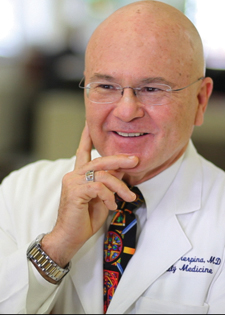 BY Victor S. Sierpina, MD, ABFM, ABIHM, Director, Medical Student Education Program, WD and Laura Nell Nicholson Family Professor of Integrative Medicine, Professor, Family Medicine University of Texas Distinguished Teaching Professor
BY Victor S. Sierpina, MD, ABFM, ABIHM, Director, Medical Student Education Program, WD and Laura Nell Nicholson Family Professor of Integrative Medicine, Professor, Family Medicine University of Texas Distinguished Teaching Professor
Primary care is indeed primary. It is the foundation of our health care system. Those who have a primary care doctor have fewer hospital days, better care of chronic disease, improved screening, and immunization rates, and overall improved health.
A root cause of health disparities is the lack of affordable, available primary care and primary care doctors for the underserved. This caused a major gap in COVID deaths among Blacks and Hispanics and those with multiple co-morbidities during the pandemic.
During the COVID immunization rollout, we in primary care were quickly able to identify our high-risk patients and get them immunized early on. Through telehealth, we were also able to continue to manage acute and chronic illness at times when patients were unable or unwilling to come to a health care facility due to COVID restrictions, lockdowns, and fears.
As family doctors, we stand at the entrance and exit to not only our health care system’s complex web of referrals, inpatient services, technology, procedures, but we also stand at the gates of life…and of death.
We are witnesses, guides, and helpers for our patients through all stages of life, from womb to tomb.
A student who had recently completed her Family Medicine Clerkship sent me a thank you card. She expressed her gratitude about how much she had learned about the clinical practice of medicine in a short one-month block.
What also struck her was that not only did I provide a broad range of care for my patients, but cared for them holistically as people. I knew not only their medical history but their family history, their social context, things about their lives that only come out in a long a trusted relationship. They also knew about me and my family, often asking after the status of my wife, kids, and grandkids.
This is the interactional, relational, and integrative part of Family Medicine that I and my colleagues love so much. Building lifelong relationships, knowing the complexity of people’s lives through wellness and illness, being there with them at life’s turning points, both joyful and tragic: this is what being a family doctor is about.
A couple of illustrative stories…
It was a Friday morning and I was driving back from teaching at a medical conference in Austin. A storm was brewing in the Gulf. I got a call from Charlie. Lea was in labor. I had following her for prenatal care and really wanted to be at the delivery.
I not only took care of Lea and Charlie but their two other children and both sets of grandparents. I felt like a part of the family.
I drove carefully and as fast as the law allowed, sometimes a bit faster, and managed to make it to the delivery room around 3 PM just in time to catch the baby.
It was a magic moment, as all births are, one in which we all bonded around this new life coming into the world.
We made it through the storm, evacuating the new baby and family over the weekend. I continue to care for the whole family until they relocated to Corpus Christi. I also took care of the grandparents until they gradually passed on from heart issues and old age.
Three generations of life and death, change, and trust.
Before I came to Texas, I was a country doctor in a frontier area, practicing on a mountainside in Colorado. I got a panicked call on a Saturday morning from a patient’s mom.
There was something wrong with her grandbaby.
I had seen the 6-month-old that for well-baby checks and shots, though I hadn’t attended the delivery.
I rushed over to find an inconsolable family and several friends weeping.
The baby had died overnight.
Sudden Infant Death Syndrome.
I had the responsibility of pronouncing the death, notifying the coroner and the police, and doing what little I could to assuage their grief.
The mom blamed herself. She was a smoker and had already read how that was a risk for SIDS. I tried to allay that guilt and explained there are other causes of SIDS, many of which we don’t know.
It was very hard all around and a powerful reminder of the opportunities we have as physicians to be present and stand at the gates of the most crucial moments in the lives of our patients.
After 40 years in practice, my mind and that of every family doctor is filled with many such amazing, rich, and heartfelt stories about our patients and their families. Surely every doctor and nurse could say the same.
It is what keeps us doing what we do, that sense of relationship, commitment, service, trust, and caring, alongside the suffering and compassion we feel with them.


